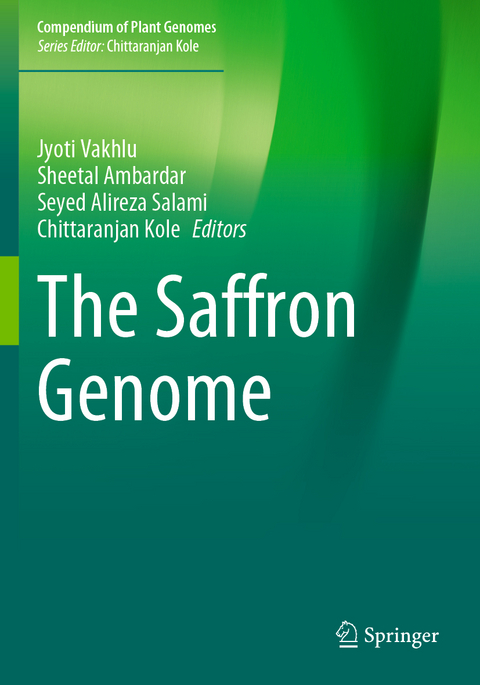
The Saffron Genome
Springer International Publishing (Verlag)
978-3-031-10002-4 (ISBN)
This book is about Saffron (Crocus sativus L.) that is the most expensive spice in the world. Though there are other books on saffron but none of them has comprehensive information on saffron genome, transcriptome, proteome, metabolome and microbiome. The book has been divided into five sections and 17 chapters that cover all the areas related to its cultivation, market & economy, genomics, transcriptomics, proteomics, metabolomics, tissue culture, microbiomics, metagenomics etc. In addition a chapter on molecular markers and their use in molecular genetic mapping in saffron that lacks genetic diversity as a sterile plant paves a way for selection of elite varieties based on the epigenetic variability. A section on in-vitro propagation elaborates on the corm production under controlled conditions. In summary this book encompasses most of the information available on this golden spice
lt;p> Prof. Jyoti Vakhlu, the former director School of Biotechnology, University of Jammu, India, has 22 years of teaching and research experience. She has been teaching courses based on molecular biology, recombinant DNA technology, genomics and metagenomics to Master's, M.Phil., and doctoral students in the University of Jammu that includes theory as well as practical courses. She has published about 50 research papers in reputed scientific journals. She has been able to generate extra mural research funding from national and international agencies such as DBT, DST, ICAR, UGC, NMPB, DAAD, Germany, ICGEB, Italy, India-Sri Lanka research foundation, and WTZ-OEAD, Austria. Prof Vakhlu's group is involved in unravelling the cultivation-dependent and cultivation-independent microbial diversity in extreme environment soil from north-western Himalayas, healing clay of Chamlyal and saffron, Crocus sativus L. by using molecular tools.
Dr. Sheetal Ambardar, Assistant Professor at School of Biotechnology, University of Jammu, is a promising young researcher with an experience in genomics, transcriptomics, microbiomics, next generation sequencing (NGS) technology, and bioinformatics analysis. She has been working in this area for the m last 14 years. She is involved in teaching Microbiology, Biotechnology and Bioinformatics to postgraduate and Ph.D students of the School. Previously, she was working as a DST women scientist-A at National Center for Biological Sciences (NCBS), Bengaluru. She has pioneered the research on saffron microbe/microbiome interaction. A distinction holder throughout her academic carrier and gold medallist in her Masters in microbiology, Dr. Ambardar has qualified most of the national level fellowships in India for research, such as DST Women Scientist Award, DST,(2018), National Postdoctoral Fellowship (N-PDF), SERB, DST,(2016), UGC-MKU-NRCBS Visiting Fellowship (2011), INSPIRE-AORC Fellowships in Microbiology, DST, (2010), and NET CSIR-JRF (2007, 2009). She has also published her research work in more than 21 research papers in international journals including 5 book chapters and edited a book on Neem entitled "The Neem Genome".
Dr. Seyed Alireza Salami has about two decades of experience in bioscience, molecular genetics, and bioinformatics. He is currently CEO and the R&D manager of a start-up biotechnology company (OMICS) in Iran which led many projects on next generation sequencing and database technology, CRISPR-Cas editing technology, and recombinant proteins.
Dr. Salami received his Ph.D. in Biotechnology and Molecular Genetics on "Genetics of Host-Pathogen Interactions". His interest in medicinal plants and pharmaceutical industry led him to start two mega projects on medicinal herbs mainly cannabis (CannOMICS) and saffron (CrocOMICS) since 2010 towards putting valuable natural metabolites in food and health baskets.He is collaborating with numerous university and research centers around the world which led to generate several research funding. He is a reviewer of several scientific journals and is the author and the co-author of more than 60 scientific papers in reputed scientific journals. He is the owner of MedCannaBase.org and SaffronOmics.com which aim to gather all cannabis and Crocus experts together as a Union. He is also a member of Organization of Saffron Exporting Countries (OSEC), head of Industrial and Medical Cannabis Research Institute (IMCRI), member of Iranian Society for Horticultural Science (irSHS), and Dean of Biotechnology and Genetic Resources branch of irSHS.
Prof. Chittaranjan Kole is an internationally reputed scientist with an illustrious professional career spanning over thirty-eight years and original contributions in the fields of plant genomics and biotechnology leading to the publication of more than 150 research
Crocus sativus saffron: A 360 degree overview.- Reference genome of Saffron "The Golden condiment".- "SaffronOMICS: Novel approaches towards putting saffron data at work".- Bioinformatics for saffron-omics and crop improvement.- Genetic mapping and molecular markers in Saffron.- Soil Classification, Nutrient Management and Land Cover of Saffron Growing Areas of Kashmir Valley.- Cultromic and metabarcodic insights into saffron-microbiome associations.- "Saffron, bacteria and mycorrhiza".- Diversity and bioprospection of fungal endophytic microbiome of Crocus sativus L. (saffron).- Epidemiology and Management of Corm Rot of Saffron.- Pathogenicity and genetic diversity of microbes in Crocus sativus L. and various strategies combating diseases.- Tissue culture techniques for Saffron improvement.- Saffron production under control condition.- Saffron: Metabolomics and quality points of view.- Saffron in phytotherapy : Pharmocological properties and medicinal uses.- Economic Aspects of Saffron in the World.- Marketing prospects for Saffron in domestic market: the case of Moroccan PDO.
| Erscheinungsdatum | 21.11.2023 |
|---|---|
| Reihe/Serie | Compendium of Plant Genomes |
| Zusatzinfo | XVIII, 300 p. 72 illus., 58 illus. in color. |
| Verlagsort | Cham |
| Sprache | englisch |
| Maße | 178 x 254 mm |
| Gewicht | 610 g |
| Themenwelt | Naturwissenschaften ► Biologie ► Botanik |
| Naturwissenschaften ► Biologie ► Genetik / Molekularbiologie | |
| Technik ► Umwelttechnik / Biotechnologie | |
| Schlagworte | Biocontrol and plant growth promoting bacteria • Controlled condition cultivation • Crocus sativus • De novo genome sequence • Metablomics • Microbiomics • Transcriptomics |
| ISBN-10 | 3-031-10002-6 / 3031100026 |
| ISBN-13 | 978-3-031-10002-4 / 9783031100024 |
| Zustand | Neuware |
| Informationen gemäß Produktsicherheitsverordnung (GPSR) | |
| Haben Sie eine Frage zum Produkt? |
aus dem Bereich


